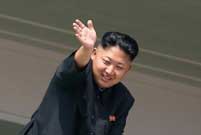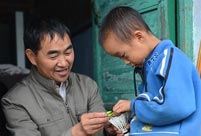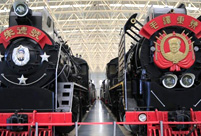Xi asked both sides in the Syrian conflict to find a political solution.
He said China is ready to enhance communication and coordination through the UN Security Council, and will continue its unremitting efforts to bring about a political settlement.
Leaders at the SCO summit endorsed the idea of placing Syria's chemical weapons under international control and gradually destroying them.
They also called for an immediate end to the violence, the start of inclusive political dialogue as soon as possible and for an international conference to be convened.
Chen Yurong, a senior researcher at the China Institute of International Studies, said: "China and Russia have long held consistent stances on the Syria issue. They object to the use of armed force and outside intervention, and insist on respect of a country's sovereignty and the UN's leading role.
"We can see that Russia and China's stance has won widespread support."
At the SCO summit, the leaders also vowed to jointly fight terrorism, extremism and separatism, as well as drug smuggling and transnational organized crime.
Li Wei, director of the Institute of Security and Arms Control Studies at the China Institutes of Contemporary International relations, said the SCO is crucial for China's national security, because the most direct terrorist threat to China, "East Turkistan" forces, is spreading in the region.
Chen said security cooperation has always been the highest priority at SCO summits.
"The organization was originally established to protect stability in Central Asia. Now, the region is facing complex security challenges, including the impact from continuing turmoil in the Middle East and North Africa and the aftermath of US troops withdrawing from Afghanistan, which will be completed in 2014."


 DPRK holds military parade to mark 65th founding anniv.
DPRK holds military parade to mark 65th founding anniv. Highlights of MAKS 2013 Int'l Aviation and Space Show
Highlights of MAKS 2013 Int'l Aviation and Space Show  10th China-ASEAN Expo opens in Nanning
10th China-ASEAN Expo opens in Nanning Photo story: A primary school of only two people
Photo story: A primary school of only two people An elderly Chinese street cleaner's love story
An elderly Chinese street cleaner's love story 'College campus queens' welcome the new students
'College campus queens' welcome the new students  'Travel everywhere in Beijing': China Railway Museum
'Travel everywhere in Beijing': China Railway Museum Chinese sports stars' school photos
Chinese sports stars' school photos  Players shining at the 12th National Games of China
Players shining at the 12th National Games of China Residences of the royal house of Savoy
Residences of the royal house of Savoy China's frigate 'Bengbu'in fire training
China's frigate 'Bengbu'in fire training The last days of Wan Aihua
The last days of Wan Aihua Highlights at 12th National Games of China
Highlights at 12th National Games of China Beijing Film Academy welcomes freshmen
Beijing Film Academy welcomes freshmen 2013 Taiwan Int'l Tourism Expo kicks off in Taipei
2013 Taiwan Int'l Tourism Expo kicks off in TaipeiDay|Week|Month